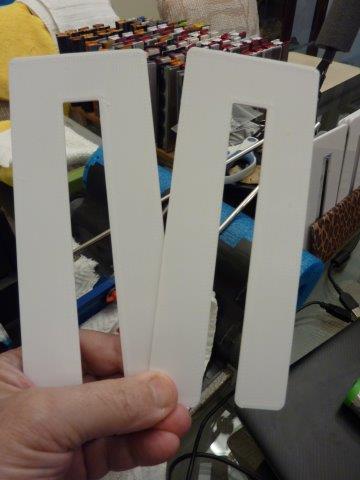Leading vs. trailing edge strokes
Recent › Forums › Main Forum › Techniques and Sharpening Strategies › Thoughts/Theories/Science Related to Sharpening › Leading vs. trailing edge strokes
- This topic has 4 replies, 3 voices, and was last updated 01/03/2021 at 3:51 pm by
airscapes.
-
AuthorPosts
-
01/03/2021 at 12:19 am #55614
Several weeks ago I saw a video of Clay sharpening a knife using leading edge strokes. I saw him do the same in a video of a tradeshow where he was demo’ing a WE to someone. Doing some more searching, I discovered multiple forum posts from 2013, 2016 and 2020 that discussed the merits of using leading edge strokes. Someone had also posted hi-res pics of edges that seem to show that leading edge strokes produce better edges. Many of the earlier posts were from Clay; it seems he was a very active forum participant back then.
So then, I thought, I should try it. I happened to have a beat up, very dull, blade that I experimented on. Behold, I produced a wickedly sharp, hair whittling, paper slicing edge in record time. I only did 20 to 30 leading edge strokes per grit using this (diamond) progression: 100 (I spent extra time with the 100 because I had to reprofile), 200, 400, 600, 800, 1000, 1500, 2200, and finishing with the 1.4mµ and 0.6mµ ceramics. No stropping.
Granted, this was an AUS-8 blade, so nothing fancy, but I was dumbfounded by how great the result was and how fast I went. I think I’ll be using leading edge strokes a lot more from now on unless someone more experienced than me can tell me good reasons not to. I’ll paste some links below FYI.
Rodger
Comment at this link:
“A few years back Clay Alison of Wicked Edge fame did a study and found that knives sharpened exclusively with edge leading strokes were slightly (but measurably) more sharp than those done exclusively with edge trailing strokes using the same progression and angles. In light of these results, I sharpen with edge leading strokes only (except when using lapping films and strops). I have also read reports from fellow sharpeners that steels like Maxamet have issues with carbide tear out if you use edge trailing strokes.”An interesting forum discussion in 2013.
Several interesting hi-res pics of edges from a post in 2016.
01/03/2021 at 6:56 am #55616Hi Roger! Take a look at this video, it demonstrates the different types of strokes that can be used with the WE and when and how to use them. It has be very helpful to many folks when they first get going.
https://www.youtube.com/watch?v=-RrvnZRVc-I&ab_channel=JendeIndustries
01/03/2021 at 11:03 am #55618Rodger, I use edge-leading strokes with every grit I use for every knife I sharpen. Please exercise care with edge leading strokes. It’s very easy to catch a dangling finger with the exposed sharpened knife edge as you bring the stones down and onto the knife edge.
I use these safety shields made by “airscapes”. They place a hard physical barrier between my finger tips and my sharp knife edges. It doesn’t matter that they are opaque. I’m sitting directly behind the knife handle and look forward right up the middle.
Here’s the safety shields W.E. offers. Even though you’d think the clear plastic would be better, I find them too difficult to work with. By their design they are harder to get on and off the stones.
Some W.E. users prefer to wear cut proof gloves. While other W.E. users use a finger hold technique on the sharpening stones that they feel always keeps their fingertips below the exposed knife edge and out of the way.
It doesn’t matter what you like to use as long as you put your safety first!
Marc
(MarcH's Rack-Its)Attachments:
You must be logged in to access attached files.
1 user thanked author for this post.
01/03/2021 at 2:32 pm #55632Hi Marc, thank you for your thoughtful response. I recently bought those same shields and mostly use them. I’ll take using them always more seriously, though.
BTW, at this link they tested a bunch of cut resistant gloves. I thought others may want this info too. I also learned a fair bit about ANSI cut resistance levels (A1 through A9); also interesting.
1 user thanked author for this post.
01/03/2021 at 3:51 pm #55634Hi Marc, thank you for your thoughtful response. I recently bought those same shields and mostly use them. I’ll take using them always more seriously, though. BTW, at this link they tested a bunch of cut resistant gloves. I thought others may want this info too. I also learned a fair bit about ANSI cut resistance levels (A1 through A9); also interesting.
I have a chainmail glove, still in the package… unfortunately you must touch your bevel often to know where you are in the process..
-
AuthorPosts
- You must be logged in to reply to this topic.
